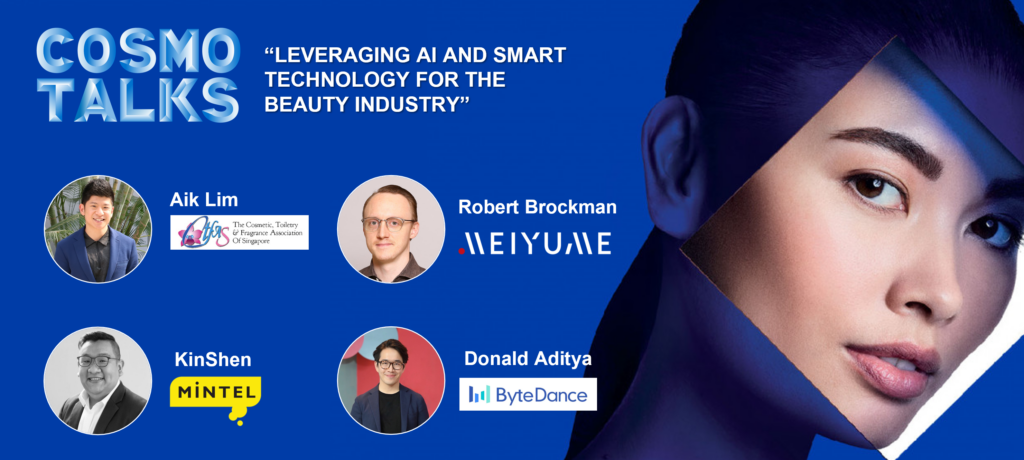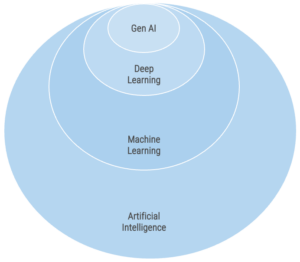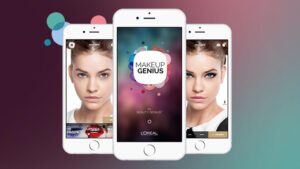How AI and Innovative Technologies are Redefining Consumer Engagement and Product Development in the Beauty Sector
Future-proof your brand through AI and Smart Tech across the different supply value chains

May 2024 – In the rapidly evolving beauty industry, the integration of Artificial Intelligence (AI) and smart technologies is revolutionizing every aspect of the value chain. From product development to consumer engagement, AI is not just a futuristic concept but a present reality driving innovation and efficiency. This article explores insights shared by industry leaders from Meiyume, Mintel, and Bytedance during a panel discussion at CosmoTalks – Cosmoprof CBE Asean Bangkok 2024, highlighting how AI and smart technologies are transforming the beauty industry.
Understanding AI and Its Components
Before diving into the role of AI and smart technology in the beauty technology, it is crucial to first understand what they are. AI can be broken down into two main components: machine learning, and deep learning. While AI aims to create systems that can learn, reason, and behave like humans, machine learning is a subset of AI. It involves systems that can optimize algorithms and learn from data without explicit programming.

Deep learning, a subset of machine learning, focuses on identifying patterns and features to make sense of large data sets. Generative AI, a subset of deep learning, is becoming increasingly significant in the beauty industry, although it has not yet reached the point where it can completely mimic human behavior.
The role of AI across different value chains
AI in Market Research and Consumer Insights
The role of AI in market research was also emphasized where it can be used to quickly analyze and understand market trends and insights. For example, Mintel Leap is a closed-loop AI system which allow users to query trends and receive insights quickly. This technology eliminates the need to sift through vast amounts of data manually, enabling researchers to spend more time on value-added tasks. At Meiyume, our Beauty Intelligence Platform (BIP), also leverages AI and machine learning to analyze consumer reviews and feedback, providing valuable insights into product and ingredient trends, and consumer preferences.
The significant impact of deep learning in social media platforms was also highlighted. At TikTok, they leverage on AI to enhance user experiences through personalization, recommending content based on user behavior. This not only increases user engagement but also provides beauty brands with opportunities to create compelling content.
AI in Product Development and Formulation
AI is also making strides in product formulation. For example, Potion AI is able to simplify the formulation process by suggesting ingredients and formulations based on desired product characteristics. This technology reduces the trial-and-error phase in R&D, accelerating product development and innovation.
Supply Chain Optimization
AI can also be applied in supply chain where it can analyze consumer sentiment and sales data to inform demand planning, reducing the risk of overproduction or stockouts. By understanding consumer preferences and market trends, brands can better align their supply chain operations with actual demand.
Smart Technologies Beyond AI
The panel also touched on non-AI smart technologies in the beauty industry. For example, the industry is seeing an increasing adoption of smart mirrors and virtual try-ons, like L’Oreal’s Makeup Genius, which enhances the consumer shopping experience by allowing them to see how products will look on their skin. These technologies, although not AI-driven, use advanced algorithms to provide personalized recommendations and improve customer satisfaction.

Ethical Considerations and Data Privacy
One of the critical challenges discussed was the ethical use of AI and data privacy. As AI systems collect and analyze vast amounts of personal data, ensuring transparency and consent is crucial. Brands need to communicate how consumer data is used and take measures to protect privacy. Ethical considerations also extend to avoiding biases in AI algorithms, ensuring that all consumers are fairly represented.
The Future of AI
The integration of AI and smart technologies in the beauty industry is not just a trend but a fundamental shift in how brands operate and engage with consumers. From enhancing product development and supply chain efficiency to creating personalized consumer experiences, AI offers immense potential. However, as the industry continues to innovate, it is essential to address ethical concerns and ensure that technology serves to enhance, rather than exploit, consumer relationships.
As we move forward, the beauty industry will undoubtedly see more sophisticated applications of AI and smart technologies, driving growth, and transforming consumer experiences. For brands looking to stay ahead, embracing these technologies and prioritizing ethical considerations will be key to their success.
Meiyume
At Meiyume, we strive to be at the forefront of beauty innovation, delivering complete end-to-end solutions encompassing creative packaging, advanced formulation development, and efficient global production. We are excited to share our AI-driven insights and actively engage in industry discussions such as CosmoTalks. Our participation in these events highlights our commitment to shaping the future of the beauty industry through advanced, data-driven solutions.